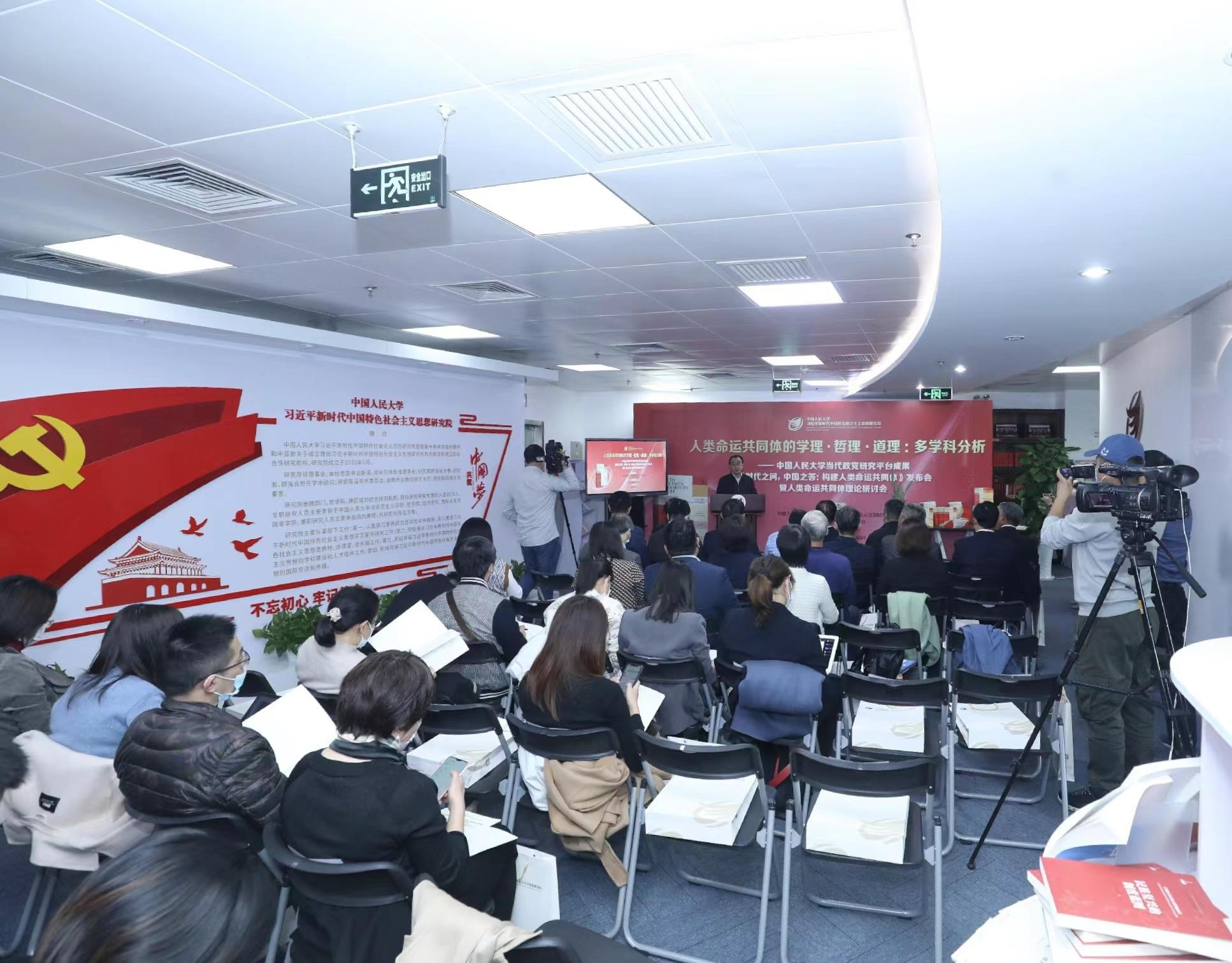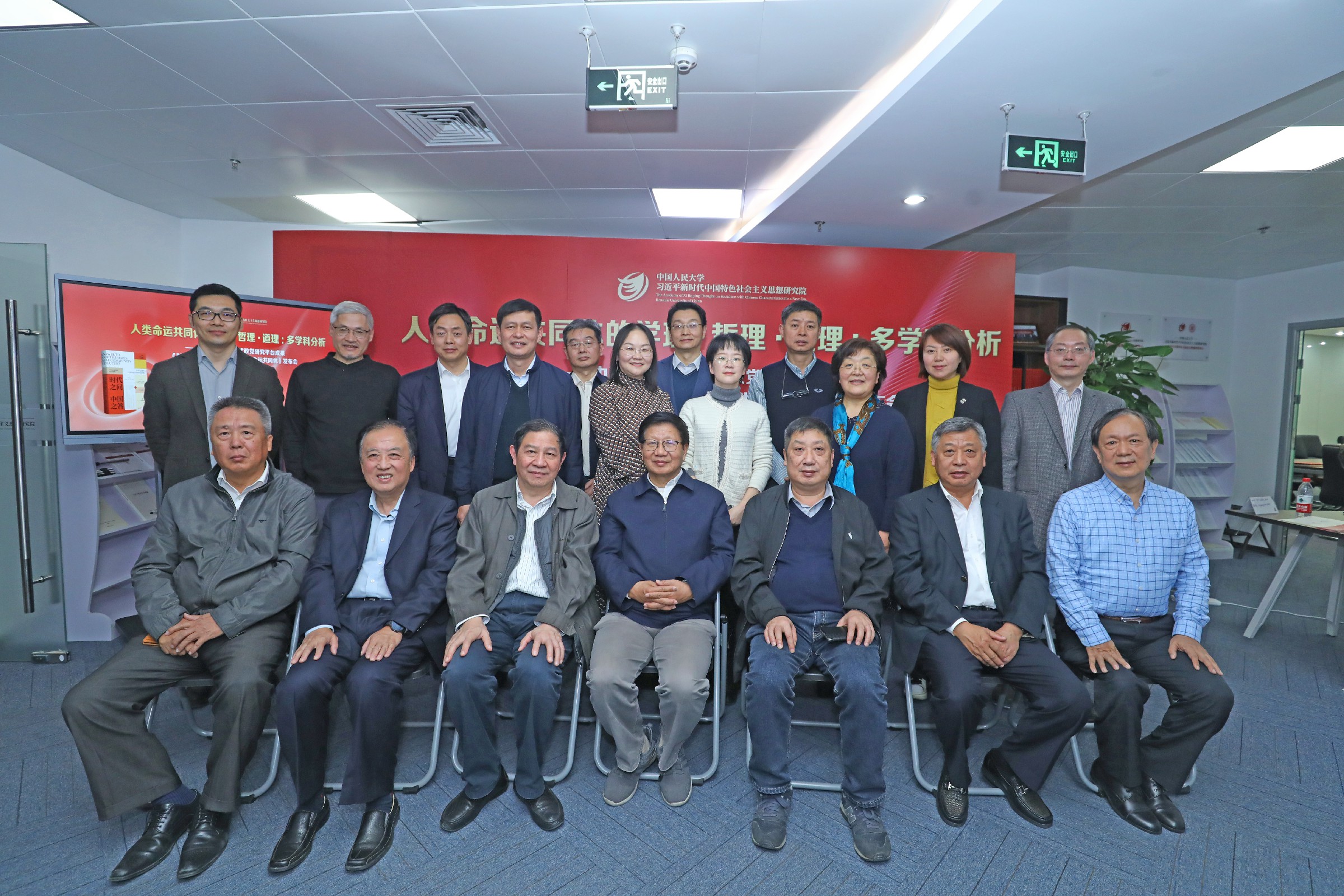Press Conference on China’s Answer to the Question of the Times: Build a Global Community with a Shared Future & Seminar on the Theory of a Community with a Shared Future for Mankind Held
Upload time: November 16, 2021
On the afternoon of November 22, 2021, the Press Conference on China’s Answer to the Question of the Times: Build a Global Community with a Shared Future, an output of the Contemporary Political Party Research Platform of RUC, and Seminar on the Theory of a Community with a Shared Future for Mankind was held at the Academy of Xi Jinping Thought on Socialism with Chinese Characteristics for a New Era, RUC.

Jin Nuo, Party Secretary of the Renmin University Committee of the CPC, met with some of the guests present at the conference.
When delivering a speech, Wu Fulai, Deputy Secretary of the Party Committee, Secretary of the Discipline Inspection Commission and Chief Expert of the Contemporary Political Party Research Platform, RUC, pointed out that China’s Answer to the Question of the Times: Build a Global Community with a Shared Future, an output of the RUC's Contemporary Political Party Research Platform, adopts a multidisciplinary perspective that broadens the thinking for deepening the study of the community with a shared future for mankind. RUC will take the opportunity of this theory seminar to further strengthen the building of its think tank platforms, continuously promote multidisciplinary exchanges and dialogue on building a community with a shared future for mankind, and work together to build a new model of international relations, thus making new and greater contributions to deepening the study of building a community with a shared future for mankind.
Li Xiongwei, Editor-in-Chief of the Hunan People's Press, said that it is a great honor to launch China’s Answer to the Question of the Times: Build a Global Community with a Shared Future, a key book included in the thematic publications of the Publicity Department of the CPC Central Committee on the occasion of the centenary of the founding of the CPC. The Hunan Provincial Press and Publication Bureau, China South Publishing & Media Group and Hunan People’s Press highly valued the publication of this book. Upon its approval, the publishing project was immediately incorporated into the annual key project library management of thematic publishing at all levels, requiring the publishing task to be completed with high standards and quality. The exquisite book in front of everyone today is the joint effort between Mr. Wang Yiwei and our press, he added.
Li Junru, former Vice President of the Party School of the CPC Central Committee, Yang Huilin, former Vice President of RUC and Dean of the School of Chinese Classics, RUC, Wang Xiangming, Associate Dean of the Academy of Xi Jinping Thought on Socialism with Chinese Characteristics for a New Era, RUC, Xu Bu, President of the China Institute of International Studies and Secretary-General of the Research Center for Xi Jinping Thought on Diplomacy, Chen Yuming, Vice Chairman of the China Public Diplomacy Association and former Chinese Ambassador to Sweden and Australia, and Li Qiangmin, Secretary-General of the Charhar Institute and former Chinese Ambassador to Uganda and Zambia, delivered keynote speeches.
Former Deputy Director of the China Foreign Language Publishing Administration and Vice Chairman of the Translators Association of China sent a written address.
Other speakers included Hu Zhijian, President of the Chinese Academy of Science and Technology for Development, Zhou Changxin, Executive Vice President of the Cultural Policy Committee, China Association of Policy Science, Xiao Lianbing, Secretary General of the Guangming Daily International Exchange, Cooperation and Communication Center, Ji Deqiang, Deputy Dean of the Institute for a Community with Shared Future, Communication University of China, Liu Jianping, Distinguished Fellow of the Research Center for Xi Jinping Thought on Socialism with Chinese Characteristics for a New Era, University of International Business and Economics, Professor Yao Zhongqiu from the School of International Studies, RUC, Liao Binyu, President in Residence of the Huaxia Culture Promotion Association, Yu Jia, Director of the Department of International Development Cooperation of the Institute of New Structural Economics, Peking University, Professor Zhang Zhizhou from the School of International Relations and Diplomacy, Beijing Foreign Studies University, Lou Xiaoqi, Founding President of the Civilization Magazine, Diao Daming, Associate Professor of the School of International Studies, RUC, Zhang Xiaomeng, Deputy Division Chief of the International Office and Associate Dean of the School of Marxism Studies, RUC, etc.
When delivering a summary speech, Wang Yiwei, the author of this book, Associate Dean of the Academy of Xi Jinping Thought on Socialism with Chinese Characteristics for a New Era and Research Fellow of the Contemporary Political Party Research Platform, RUC, thanked experts and scholars for attending the meeting, as well as Pan Yue, Vice Minister of the United Front Work Department of the CPC Central Committee, and Martin Albrow, Fellow of the British Academy of Social Sciences for writing prefaces to the book. The study of a community with a shared future for mankind is the natural extension and deepening of the study of the Belt and Road Initiative, and the relationship between the two is like that between laws and techniques. Building a community with a shared future for mankind reflects our confidence in four aspects, and is our knowledge for creating a theory of saying goodbye to modern times and walking out of Western-centrism. It provides a historical opportunity for the establishment of disciplinary, academic and discourse systems which are feasible at home and abroad. The current academic research is embracing an opportunity for prosperity and development. The purpose of holding such a seminar is not only to conduct interdisciplinary and multidisciplinary dialogue, but more importantly, to carry out the integration and innovation beyond disciplinary boundaries.




